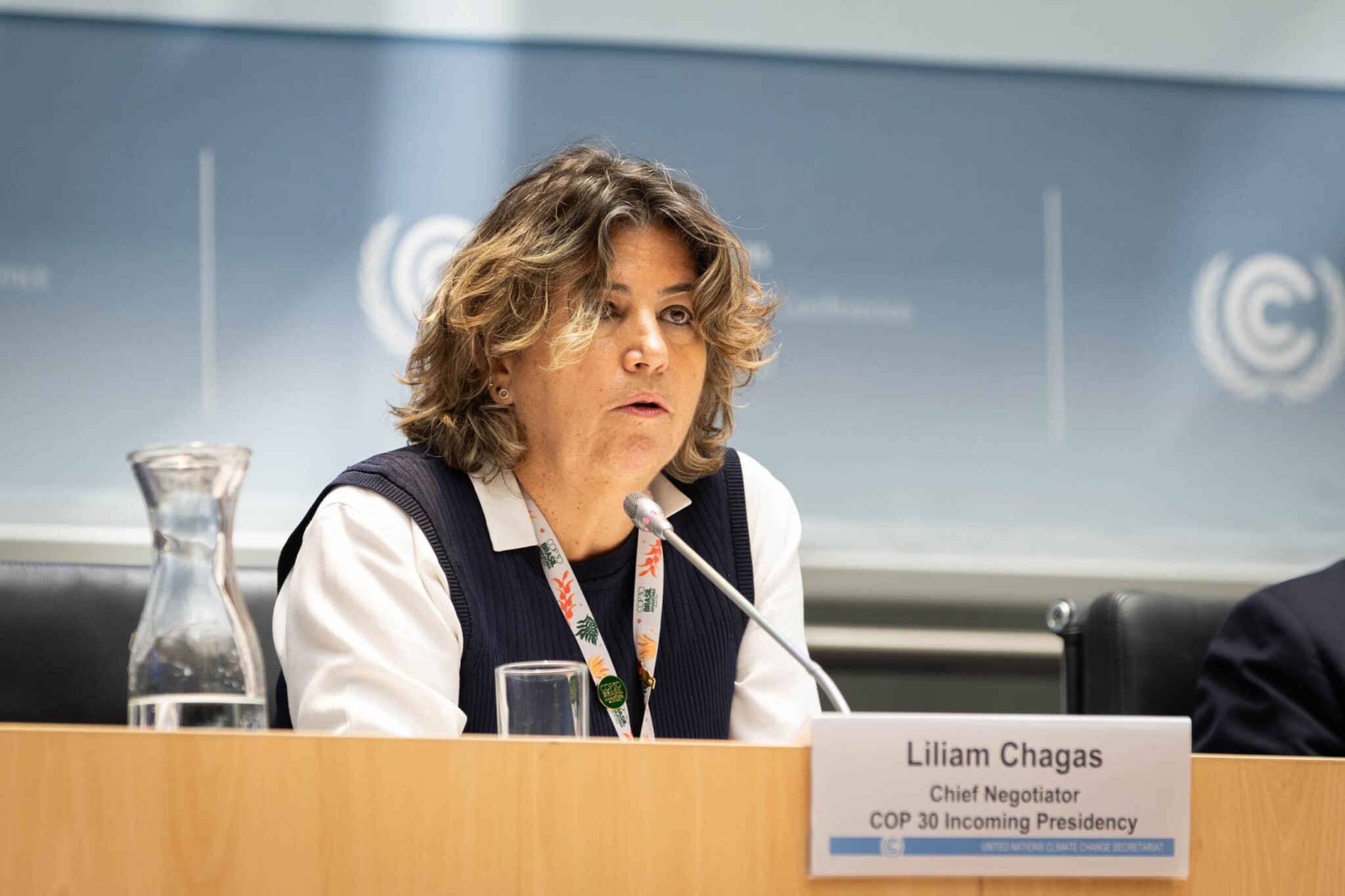Brazil’s climate negotiator shares vision for COP 30 and the next decade of nature and climate action: ‘The sky is the limit’

IISD/ENB - Kiara Worth
Rather than a single defining decision, COP30 promises a tapestry progress — from ambitious national climate plans to innovative forest finance. What is at stake at COP 30 is not just 1.5ºC, but the credibility of global climate governance and the next decade of sustainable development itself.
Read more
Related articles for further reading
As COP30 approaches, expectations are mounting — not for a singular breakthrough, but for a coordinated leap forward. Without a major headline or negotiation item to check off, Brazil’s presidency is preparing to “overdeliver” across the board. “The sky is the limit,” said Brazil’s lead climate negotiator, Ambassador Liliam Chagas, referencing the comprehensive negotiation package in the works.
Speaking at a Nature4Climate-hosted media briefing, Chagas emphasized that COP30 won’t be defined by a single decision or text. Instead, it will be shaped by progress across a range of negotiations — adaptation, mitigation, just transition, gender, finance, and forests — all aimed at moving from rulemaking to implementation.
“There is no new finance goal or a major global stocktake outcome from the Paris Agreement. What we have are negotiating mandates across all pillars of the regime, and these mandates are meant to guide from a phase focused entirely on negotiating rules—what we call the rulemaking phase of the Paris Agreement articles, which was considered completed at COP29—to a phase where these commitments must transition to implementation, putting into practice the commitments made over time,” she explained.
Chagas was joined by policy experts Fernanda Carvalho of WWF International and Cintya Feitosa of the Institute for Climate and Society to unpack the outcomes of the UNFCCC intersessional meetings in Bonn and look ahead to COP30 in Belém. The discussion formed the second media briefing of the ‘Belém Desk’, a new international journalism cohort created by N4C, iCS, TNC, WWF, and UNEP to equip journalists in their coverage of COP 30.
“The biggest challenge is no longer to figure out what the Belém package will be, but how ambitious it will be. Many things are already happening — and they need to come to light”
Ambassador Liliam Chagas, of Brazil
Beyond formal negotiations, Brazil’s COP30 Presidency is positioning Belém as a launchpad for the next decade of action. The COP30 “package” will span the full climate regime, including adaptation, mitigation, just transition, gender, finance, and forests.
Speaking to the COP 30 Presidency’s call for a global ‘mutirão’, the planned Action Agenda is described as an open call to governments, cities, Indigenous communities, businesses, scientists, and financiers to bring forward real-world solutions. “Let’s not settle for superficial decisions. Let’s make decisions that provide flexibility, tools, and support for countries to feel empowered in this transition.”
The Journey from Bonn to Belém
Held amid geopolitical instability – from war to recession to trade tensions – the UNFCCC intersessionals in Bonn nonetheless produced something rare in such turbulent times: concordance. Every agenda item except one (technology) reached the necessary agreements to move forward to COP30. According to Ambassador Chagas, that is a sign of collective resolve in the face of global uncertainty.
Highlights from Bonn include measurable indicators and implementation pathways to finalize the Global Goal on Adaptation, advancing the Just Transition Work Programme, now expanded to include development and equity dimensions, and embedding forests and waste as core mitigation issues.
Chagas also explained that the COP29 decision on the New Collective Quantified Goal (NCQG) continues to reverberate. In Bonn, countries reaffirmed the need to revisit public finance commitments and scale up ambition.
“This issue returned strongly in Bonn and makes it inescapable that we resume discussions on finance, perhaps within a broader framework, within the roadmap, to complement the $300 billion target with systemic changes and measures that make the money show up at the trillion-dollar scale, specifically the $1.3 trillion,” she said.
For this, Brazil proposes a roadmap from Baku to Belém that not only meets the 1.3 trillion but presents a more systemic approach to climate finance that includes reforms to multilateral development banks, global taxation mechanisms, and new instruments like the Tropical Forest Forever Facility.
“As you know, forest conservation is one of the mitigation tools we have. Forests absorb carbon dioxide, so it is a quicker, known, and proven way to mitigate the problem, and it is important that this happens. So, the goal is indeed to have a financial facility for tropical forests, to have it operational and possibly with pledges — already with a perspective on how it will function at COP30.”, she explained.
This broader approach to climate finance must align with societal needs, Chagas added.
“A new angle that appeared this June was a discussion about trade measures that impact international commerce under the framework, within a just transition context. International trade should be seen as a facilitator, as a means to enable exchanges among countries, generating income for all, and increasing everyone’s capacity to implement their transition policies”, she explained.
Cintya Feitosa of the Institute for Climate and Society echoed the importance of development in the climate talks.
“COPs have always been about development. The climate regime is not purely an environmental regime.”
Cintya Feitosa, Institute for Climate and Society
Achieving this will not be without added complexity. With global trust in cooperation fraying and climate impacts accelerating, Brazil’s COP30 Presidency is set to prove multilateralism still works. “We have no choice but to reinforce this regime that has been created and that has, over decades, built a set of tools, programs, and even commitments, that allow us to accept that we have the means to act—and not let this international situation distract us from what needs to be done”, she concluded.
Still, the question of whether COP30 can deliver on nature and broader implementation depends on more than frameworks and facilities.
“Nature must be treated as politically essential — not just bureaucratically visible.”
Fernanda Carvalho, WWF
Despite describing the current moment as a “melting world”, WWF’s Fernanda Carvalho agrees that now is the time to strengthen the climate regime. “Of course, it is a challenge, but it’s also an opportunity. We’re witnessing the emergence of new leaderships, new configurations, and new alliances.”, she said.
Nature is central to achieving this outcome. WWF, said Carvalho, is also pushing for a new work programme under the UNFCCC to properly integrate nature into the climate regime. “Such a program would also address key intersecting issues: carbon markets, adaptation, and Indigenous Peoples’ rights. Articles 33 and 34 of the Global Stocktake make clear that protecting ecosystems, forests, and Indigenous rights must be part of the solution — but there is still no dedicated space within the Convention to advance these intersections.”
NDCs: The ultimate credibility test
The Global Stocktake made clear what is needed. To keep the chance of limiting warming to 1.5ºC alive, global emissions must fall by 42 percent by 2030 compared to 2019. Current NDCs, however, project emissions to drop by only 2.6 percent, according to UNEP’s latest emissions gap report.
According to Cintya Feitosa, the failure of most G20 countries to submit updated NDCs by the February 2025 deadline is one of the most pressing concerns heading into Belém. These plans, which are meant to be more ambitious than the last round and informed by the Global Stocktake, are not just a bureaucratic requirement. They are the cornerstone of the Paris Agreement’s credibility.
“Right now, we are not just looking back at 10 years of the Paris Agreement,” Feitosa said. “We are being called to define the next 10.”
Rising momentum for adaptation
Long seen as the quieter cousin of mitigation, adaptation is finally getting overdue attention. As the impacts of climate change accelerate, adaptation is beginning to catch up — at least politically— as a central pillar of the global response. At the Bonn intersessionals, negotiators advanced the process of establishing a global goal on adaptation, including a set of indicators to track implementation. But as speakers at the Nature4Climate briefing made clear, technical progress without proper finance is not enough.
“We want more than a set of indicators,” said Fernanda Carvalho of WWF International. “Yes, it’s a bureaucratic win, but it must also be elevated politically and as essential as mitigation. When I started working in this field, adaptation was seen as a long-term issue. Today it’s an urgent one. We are already seeing the impacts. Everyone knows it. So we need a new perspective on adaptation — especially from those countries that are responsible for providing finance and support.”
Developing countries are determined to make adaptation a centerpiece of COP30 — not only because the impacts are already here, but because the tools to respond remain unevenly distributed. Brazil sees an opportunity for regional solidarity to shape the agenda.
“The adaptation agenda is extremely important for the African Group of Nations, and they have the full support of countries in Latin America, especially Brazil,” said Ambassador Liliam Chagas.
Cintya Feitosa of the Institute for Climate and Society underscored the urgency, noting that the costs of inaction are already being felt. “We are already losing lives and resources to extreme climate events,” she said. “International decisions should help respond to that.”
At COP30, the test will be whether adaptation is treated not just as a technical goal, but as a shared political and financial responsibility — one that reflects the realities communities are facing on the front lines.
Looking Ahead: less than 100 days until the next 10 years
With fewer than 100 days until COP30, the final stretch to COP30 is likely to be as complex as the negotiations themselves. With no single headline outcome to drive momentum, success will depend on whether countries can deliver meaningful decisions across a range of issues — and whether those decisions are supported by credible finance, implementation tools, and inclusive leadership. The implementation phase of the Paris Agreement must start in earnest, with nature at its core and finance flowing to where it’s needed most, shaping the next decade of climate action.
As Chagas said: “This is what I call the ‘test year’ for the Paris Agreement. Countries must submit their second-round NDCs – more ambitious than the first and informed by the Global Stocktake. It’s also the year we’ll see the first Biennial Transparency Reports under the new Paris format. In short, this is a crucial year for delivering across all pillars of the Agreement.”
- COP30 will be defined by many interlocking stories, not one headline issue.
- There is a clear focus on moving from rulemaking to the implementation of climate commitments.
- Bonn showed strong political will — nearly all agenda items will advance.
- Adaptation, just transition, and finance are central to the Belém package.
- Innovative finance is central to success – efforts to make the Tropical Forest Forever Facility (TFFF) a model to channel resources for forest conservation.
- Despite geopolitics, emerging alliances and creative approaches offer hope (e.g., BRICS and EU-China declarations).
- Brazil’s creative solution is to embed GST follow-up in the action agenda, engaging non-state actors.
- Civil society demands ambitious, comprehensive NDCs — especially from the G20 — covering mitigation, adaptation, finance, and justice.
- Adaptation is central this year, but lacks financing and implementation plans.
- Cross-sector solutions and a strong Action Agenda involving subnational actors and civil society are essential.
